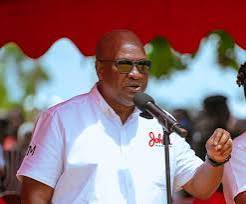Mahama Composes Vote-Buying Song for NPP: A Political Controversy
In the midst of Ghana's heated political climate, former President John Dramani Mahama recently made headlines for allegedly composing a "vote-buying" song in favor of the New Patriotic Party (NPP), sparking a wave of political debate and criticism across the nation. Mahama, a member of the National Democratic Congress (NDC), is no stranger to controversy, but this latest development has raised eyebrows and triggered a heated discussion about the integrity of Ghana's electoral process.
The Background
The song, which is said to be aimed at influencing voters ahead of the upcoming general elections, was purportedly composed and performed by Mahama, a politician known for his vibrant public presence and a deep understanding of Ghana’s political landscape. According to reports, the song encourages citizens to sell their votes in exchange for financial gain. It capitalizes on the current economic challenges, emphasizing that the ruling NPP has failed to improve the economic situation, leaving voters with limited options. The lyrics reportedly convey a message that encourages political supporters to take advantage of short-term material benefits offered by the ruling government during election periods.
Political Repercussions
The release of the song has stirred up considerable controversy. Critics from the NPP have swiftly condemned Mahama's actions, calling it a disgraceful attempt to undermine Ghana's democratic values. The NPP accuses Mahama of using this song to destabilize the electoral process and promote corruption in a time when transparency and integrity are of utmost importance.
On the other hand, Mahama’s supporters have argued that the song is a form of political satire meant to expose the NPP's own use of vote-buying tactics, which has allegedly been a pervasive issue in previous elections. Some believe Mahama’s composition is not intended to literally encourage vote-buying but to shed light on the systemic problems plaguing the electoral system. They argue that it serves as a critique of political manipulation and serves as a reminder to voters to be vigilant and reject such practices.
A Deeper Look into Vote-Buying in Ghana
Vote-buying is not a new phenomenon in Ghanaian politics. Over the years, there have been numerous reports of political parties and candidates offering money, goods, or services in exchange for votes. While it is illegal under Ghana’s electoral laws, the practice persists, especially during election years. The use of material incentives to secure votes is a reflection of broader socio-economic issues, including poverty, unemployment, and lack of access to basic services.
For some voters, the promise of immediate financial rewards can be an enticing offer, especially in rural areas where poverty rates are higher. This creates a troubling cycle, where voters prioritize short-term benefits over long-term political accountability and governance. Political parties, aware of this vulnerability, often resort to these tactics to secure electoral success.
Mahama’s Motive: A Bold Political Statement?
The question on many minds is whether Mahama’s song is genuinely a call to action for vote-buying or an attempt to satirize the current electoral system. Given Mahama's political acumen and experience, it is unlikely that he would encourage such practices openly. However, his decision to compose a song of this nature reflects the intense political rivalry between the NDC and NPP, where accusations of corruption and electoral malpractice often surface.
While the song may have raised questions about Mahama's motives, it undeniably highlights the deeper issues within Ghana's political framework. The song could be seen as a critique of the use of money and patronage in Ghanaian elections. It’s an attempt to bring to the forefront the uncomfortable reality that many political players engage in these practices to secure power.
Conclusion
The controversy surrounding Mahama’s "vote-buying" song serves as a reminder of the challenges Ghana faces in creating a truly free and fair electoral system. Whether the song is viewed as a satirical commentary or a genuine attempt to influence voters, it has undoubtedly reignited the conversation about the role of money in Ghanaian politics. As the country moves closer to the next general elections, the hope is that voters and political leaders will focus on ensuring a transparent, accountable, and corruption-free election process for the betterment of the nation.


